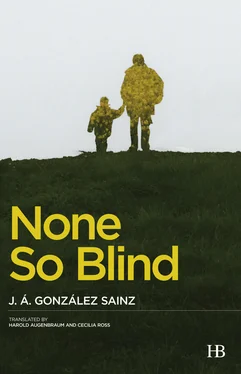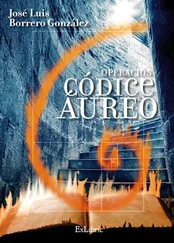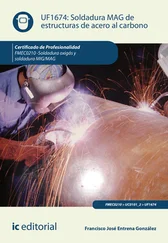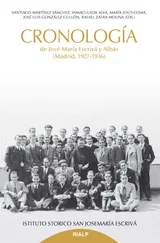“But he must have done something besides, there must have been some reason?” his son never tired of inquiring in one way or another.
Despite the many times he’d told him about the whole thing, it seemed he was never satisfied, that something was always missing, some bit of information or some detail that, despite its being miniscule or trivial on the surface, would never at its base be too insignificant for him to latch onto and use to explain to himself, in no matter how conceited or circuitous a way, that which he had always considered to be unjustifiable. To be able to go on trusting that men are not the evil beasts his grandfather, may he rest in peace, seemed to have always believed deep down that many of them were when given the slightest opportunity.
“It’s a lot to take in, I know; who would know better than I?” his father would always respond with more or less the same words each time. “But that’s the way it is, simple as that. Slice it however you like, there isn’t any more to it than that, no matter how you add it up.”
As for the rest, he concluded one day, though I may be getting out of my depth and into the kind of deep water where one always falls short or gets in over his head, that’s how it must have always been and that’s how it is still, and you’ve got to add to the tremendous pain of events, as if that alone weren’t enough, the pain that causes incredulity in others, incredulity and indifference. You tell them something and they don’t believe you. They think, or it’s convenient for them to think, that there has to be something more to it. Or maybe they don’t care, they don’t care a proverbial fig just so long as it doesn’t affect them, and so in the end you’re not able to tell anyone anything, and you don’t even want to. That pain, and maybe not so much the other pain, the original pain, and listen carefully to what I’m saying here, that’s the pain that does you in in the end and pushes you to the verge of desperation and the brink of who knows what. Other people don’t want to know, they would prefer to act as if it had nothing whatsoever to do with them, they weasel out, and they brush you off, thinking well he must have done something or to each his own; they’ll grow such a carapace of indifference and a coating of avoidance and cowardice will become so encrusted on their own skin that they’ll end up becoming inseparable from them and allowing themselves to be pickled from within by the vilest of all concoctions, a mindset that mistakes the victim for the perpetrator and gives the one the sort of treatment and consideration that corresponds to the other. Of course, the best way to believe or realize something is to have it happen to you one day. As long as it doesn’t happen to you, they’ll say, sealing the admission of their own disregard and lack of solidarity. But sometimes, not even that is enough — he concluded — not even that.
16
That early-October day, as soon as he got word of his son’s visit and was feeling more reassured after having come up with his own explanations for it, Felipe threw the old, faded jacket he usually wore to the field over his shoulders, grabbed the old satchel he left hanging behind the kitchen door, and went straight out to pick the last of the green beans, so that his son could have them for dinner. He hadn’t planned on going that day — he was still working on slowly fixing up the house — but the idea of preparing him freshly harvested vegetables seemed to suddenly give him wings. The cornfields on the riverside, though they still had a few green leaves, were already almost dried out, and the leaves on the poplars had begun to take on those yellowish hues that would soon wax golden and that had brightened his days ever since he was young, the way only true beauty, that which is eternal each time you see it, can brighten things. Look, Felipe, look, what splendor, he would remember his father saying in the most unerring tone imaginable and filled, what’s more, with a sense of awe he hoped to convey to his sons as well, as if that, that tone, that tone of awe, might rank as one of the most valuable items of any inheritance.
But when his son got there, it seemed to him that he looked troubled — something’s going on, he conjectured again, something’s going on. After hugging him hello, he barely saw more than the backside of him as he went into his room to drop his bags and then headed back out the front door again to, he said, go buy cigarettes at the bar before it closed. I’ll start dinner, he replied. It’ll be ready in about an hour, so don’t be too long.
He realized that more than hugging him, he had in fact thrown himself awkwardly onto him, sort of heavily and yet absently, as if he were avoiding any contact with him, in spite of his having been the one to reach out to him, and avoiding his gaze and his face the whole time. After a short while — he couldn’t have been gone for even five minutes — he heard him open the door again, trace his steps back to his room, and then head toward the kitchen, where he had already begun to busy himself.
Looking up without raising his head, almost out of the corner of his eye, he saw him hurry in like someone returning in exasperation to retrieve something he had forgotten, or rather to tell him something he couldn’t quite resolve whether or not to tell him, and then suddenly, looking as though he couldn’t possibly be more disgusted with himself than he was at that moment, he turned on his heel once again and left the same way he had come, with the same haste and the same hesitation and the same exasperation, but not without first setting, or more like tossing, a folded newspaper, like a reflection of his own impotence, down on the table.
He hadn’t gotten the chance to say anything to him, he hadn’t even gotten the chance to look at him, and certainly not in the eye, and that silence, that absence of words that was so telling in the end, had unquestionably amplified the muffled sound made by the sheets of newsprint falling onto the surface of the table. Ffflt , went the newspaper, and ffflt he later recalled it continuing to resonate in his head for some time, as if it were trying to tell him something.
Nevertheless, just as he had done so many other times, he took refuge in the mechanical gestures with which one generally carries out the most everyday tasks, executing them with all the care and formality he could muster. It was almost like a prescription against unease, according to his experience, to do diligently, not so much slowly as meticulously, tasks that might seem of quite little importance, to pour your whole soul into each step, as if our entire lives were bound up in each and every detail, as they very well may be. And so he pulled out two of the middle pages from the paper his son had left there, and he laid them out on the table. He usually laid down some sort of paper when he prepared vegetables, almost always a page from the newspaper or an opened out napkin, so that he could then fold the leavings up into a cone and throw them in the garbage without having to wipe down the table again, and the paper his son had left there couldn’t have come in more handy.
To one side of it, then, he put the freshly picked green beans, the carrots, potatoes, and an onion, as well as a block of lamb shoulder, and on the other, a couple of empty plates he would slowly fill up. With mechanical slowness, he scraped the skins of the carrots and then cut them lengthwise; then it was time for the potatoes, which he peeled and afterward cut into pieces as well. He cut them with a snap — first he stuck in the knife, and then, instead of slicing cleanly all the way to the bottom, at the last instant he broke the potato off, which produced that characteristic snapping sound of the finest-quality tubers. Snap, snap he went, with a rhythm that resounded strangely, like an echo, in the quiet emptiness of the kitchen.
Читать дальше












